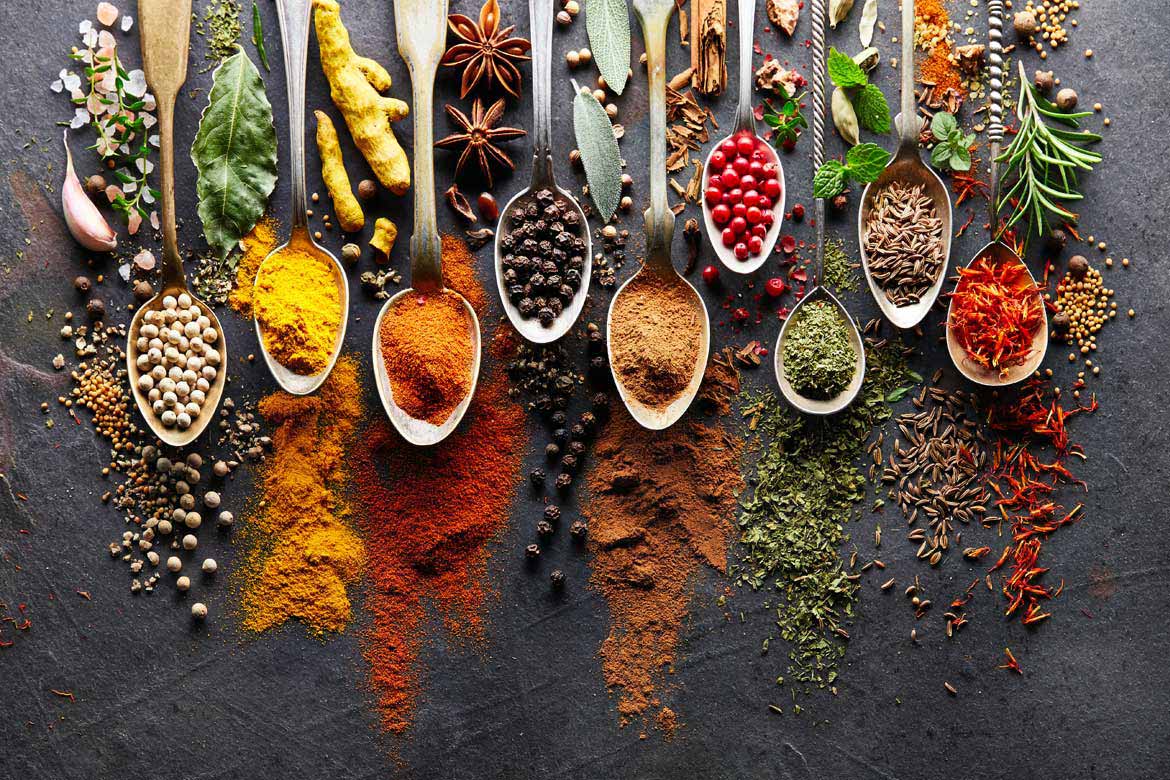
Researchers have connected gut health to everything from brain function to overall inflammatory levels. The number of bacteria in your digestive system, known as your gut microbiome, is in a delicate equilibrium. Keeping the proper amount of healthy bacteria in your microbiome can have a big impact on your health.
Certain herbs and spices have superfood properties that promote good digestion and intestinal health. Here are our dietitian’s top 9 recommendations:
Table of Contents
Ginger
Ginger is a superfood that can alleviate nausea, promote saliva and bile production, soothe the stomach, and help with motion sickness. It can also help with gas and bloating.”Ginger is such a versatile spice; you can use it to make curries, stir-fries, or ginger tea,” “While someone prefers fresh ginger, they can occasionally substitute ground or crushed ginger.”To wake up your sluggish stomach in the morning, try a ginger drink, or put minced ginger into stir-fries or curries. While fresh ginger is preferred, dried, ground ginger can also be used.
Turmeric
It is the spice that gives curry its yellow color and has been used as a medicinal herb in India for thousands of years. Turmeric includes curcumin, an anti-inflammatory and antioxidant compound with remarkable therapeutic capabilities. A 2019 study looked at the prebiotic potential of four spices: turmeric, ginger, long pepper, and black pepper, and discovered that turmeric stood out for its ability to induce favorable changes in the gut microbiota population. Turmeric can be added to soups and smoothies, as well as scrambled eggs, rice, and even your morning latte.
Cinnamon
Cinnamon is delightful, and fortunately for those of us attracted to its warm and spicy sweetness, it has anti-inflammatory effects.
It may help reduce gut inflammation, though further research is needed to determine whether it has a clinical benefit, and an animal study on the effect of cinnamon essential oil on gut microbiota discovered it may have a protective role against inflammatory bowel disease (IBD).
Cinnamon is also high in antioxidants, such as polyphenols, which, according to Jane, can help with oxidation and damage in the body.
The bay leaves
The bay leaf, which comes from the plant Laurus nobilis, is thought to have profound benefits on the gastrointestinal tract, helping to reduce toxins in our bodies and even easing irritable bowel syndrome (IBS). There are enzymes peculiar to bay leaves that may aid in efficient digestion and the digestion of specific proteins.”
Dried bay leaves are used to flavor stews, stuffings, and fish, as well as pickling and marinating.
For the uninitiated, they are not eaten but are used intact and removed when serving.
Cardamom
Cardamom is a beautiful, aromatic spice that is commonly used in Indian cuisine. However, according to a study on rats that mixed cardamom with other herbs to repair stomach ulcers, it may also have gastroprotective properties.
Another study discovered that cardamom extract, which is high in anti-inflammatory chemicals, helped lower inflammatory reactions in rats.
Cumin
Cumin is a common spice that may be used in a variety of traditional cuisines. It is also a popular remedy for indigestion, as it increases bile flow, which speeds up your liver’s digestive processes. Cumin may also boost gut health by increasing digestive enzyme activity, according to researchers. According to research, persons with IBS benefit from taking concentrated cumin regularly. Cumin, like many of these superfoods, has antioxidant and anti-inflammatory properties.
Rosemary
Rosemary isn’t typically thought of as a superfood, but it offers some surprising health advantages. According to research, rosemary can change the composition of your gut microbes. This composition may play a crucial role in maintaining a healthy weight and digesting and fermenting foods to release nutrients. Rosemary may also help to prevent weight gain, especially in obese people, as well as improve bile flow and gall bladder function.
Peppermint
Peppermint is quite relaxing, especially when drunk as tea. By relaxing the muscles of your colon, peppermint oil may alleviate severe IBS symptoms and enhance digestive function in healthy patients. Peppermint oil may also have the capacity to battle unwanted germs in your gut, which is why it is commonly used in toothpaste.
Chili powder
Cayenne pepper is a hot chili pepper that adds heat and flavor to a variety of meals. It also has several possible health benefits, including the ability to combat infections in the gut by triggering nerves in the stomach that signal the need for damage protection. According to one study, cayenne pepper may help decrease stomach ulcers. It also prevents the yeast candida from overproducing, which can harm your intestinal lining if left unchecked.
Cocoa
The majority of people are unaware that cocoa is a superfood. The flavonoids present in cocoa beans, like cinnamon, have antioxidant properties. Cocoa may also reduce stress and enhance mood, both of which lead to better digestive function. Some modest studies have also found that cocoa can boost your metabolism and promote positive microbial activity in your gut, increasing beneficial bacteria while decreasing the growth of ‘bad’ bacteria linked to diseases such as irritable bowel syndrome (IBS).






